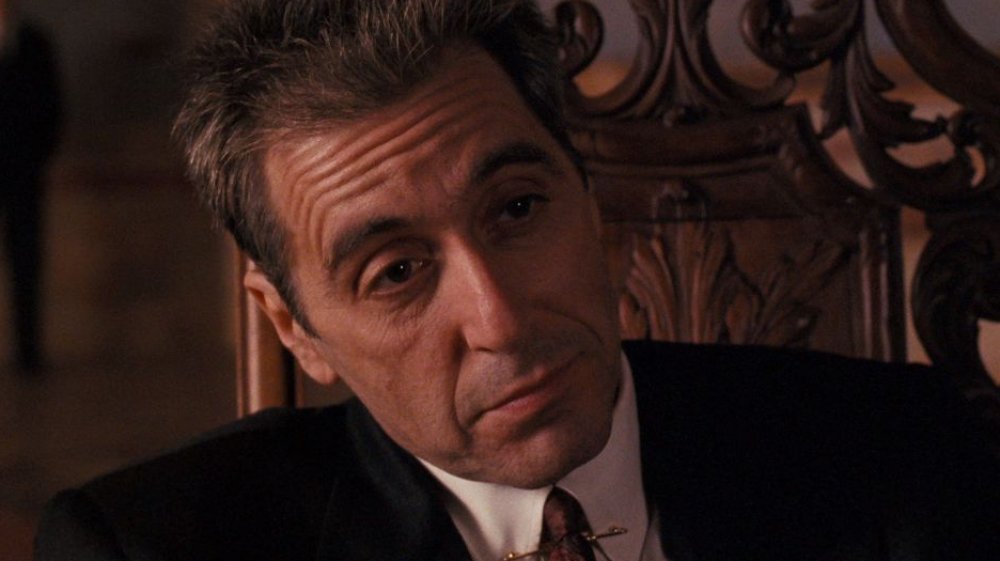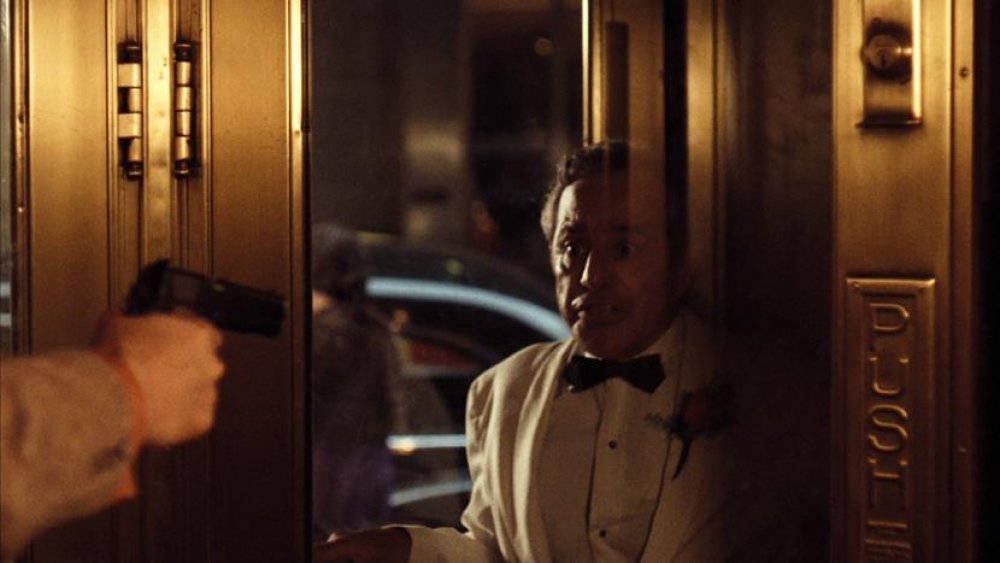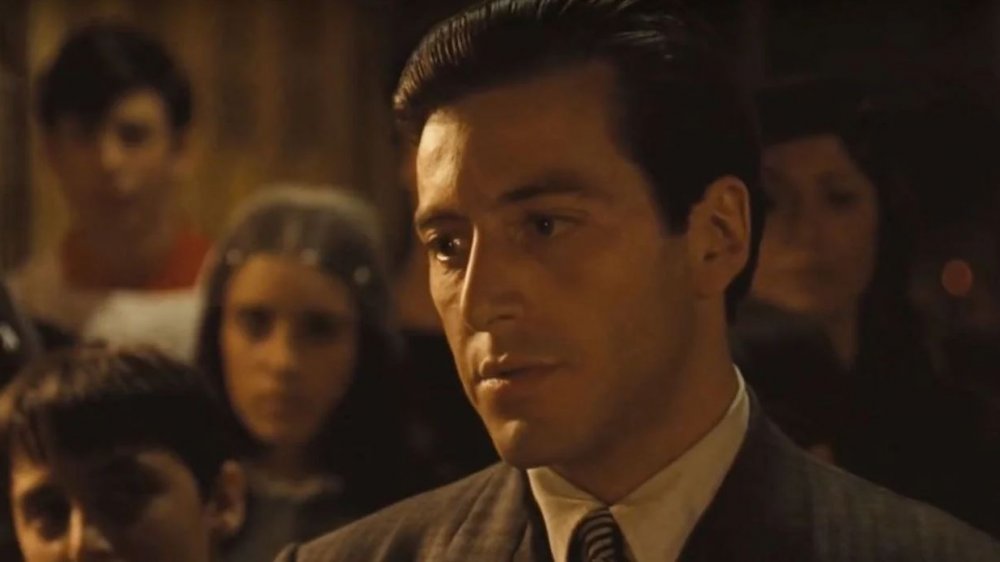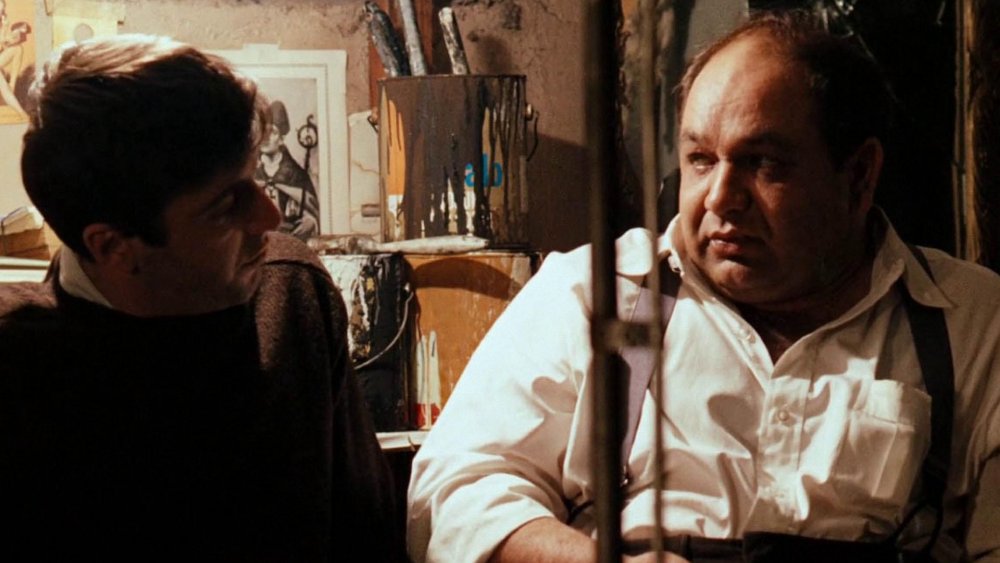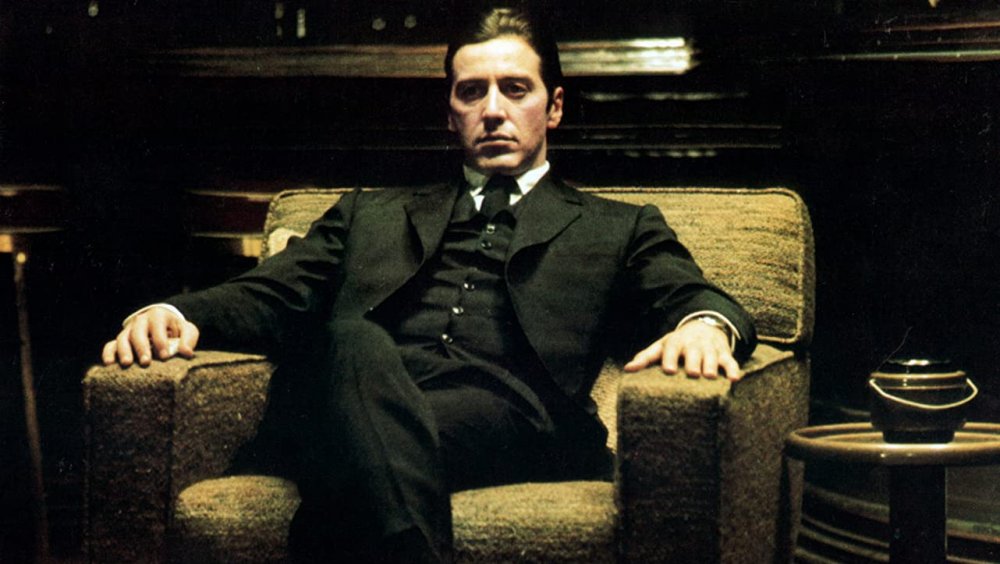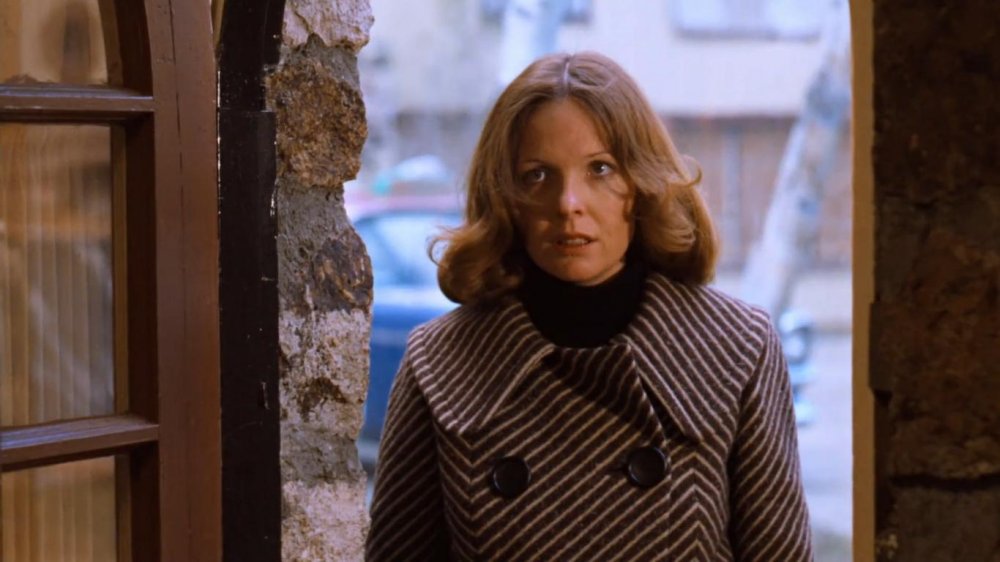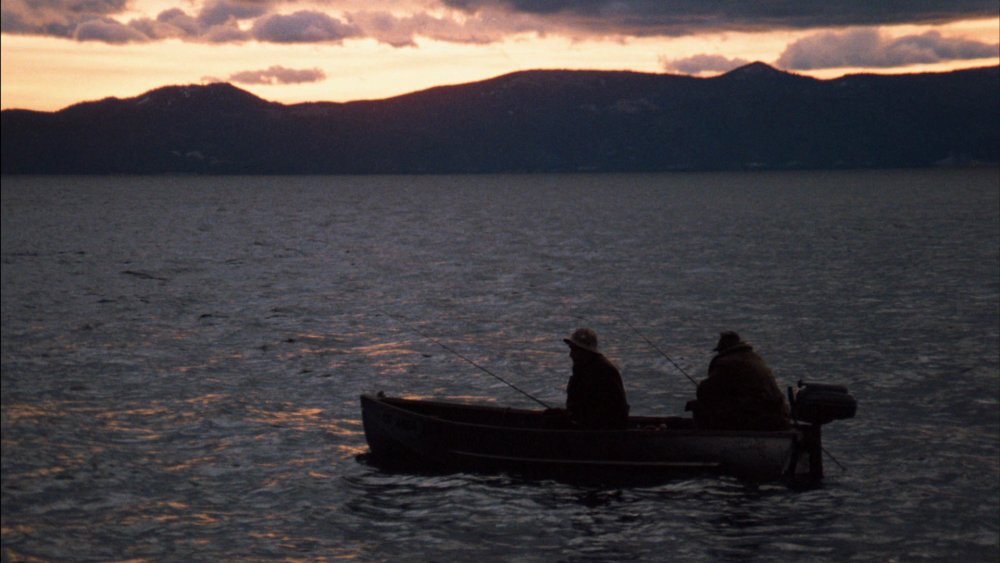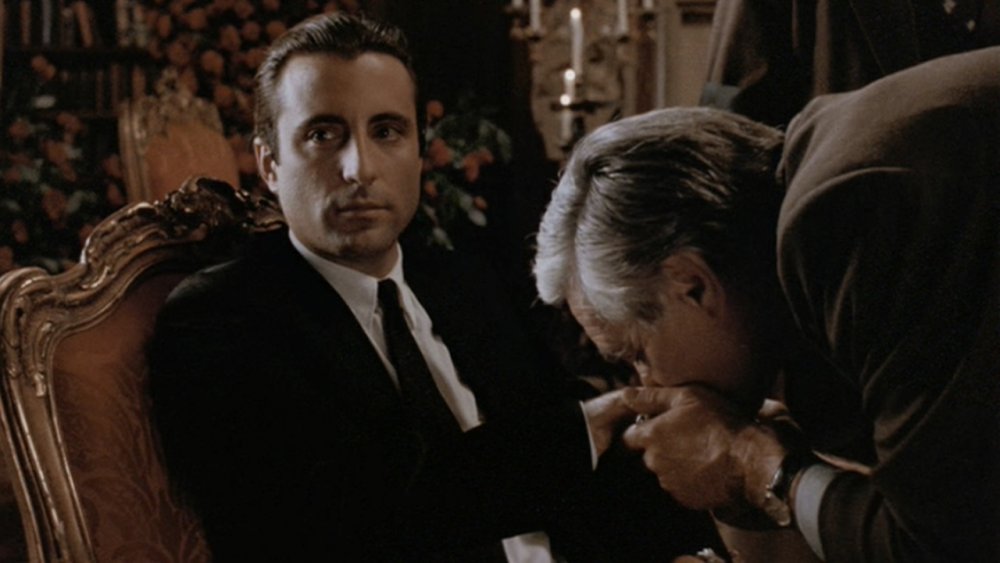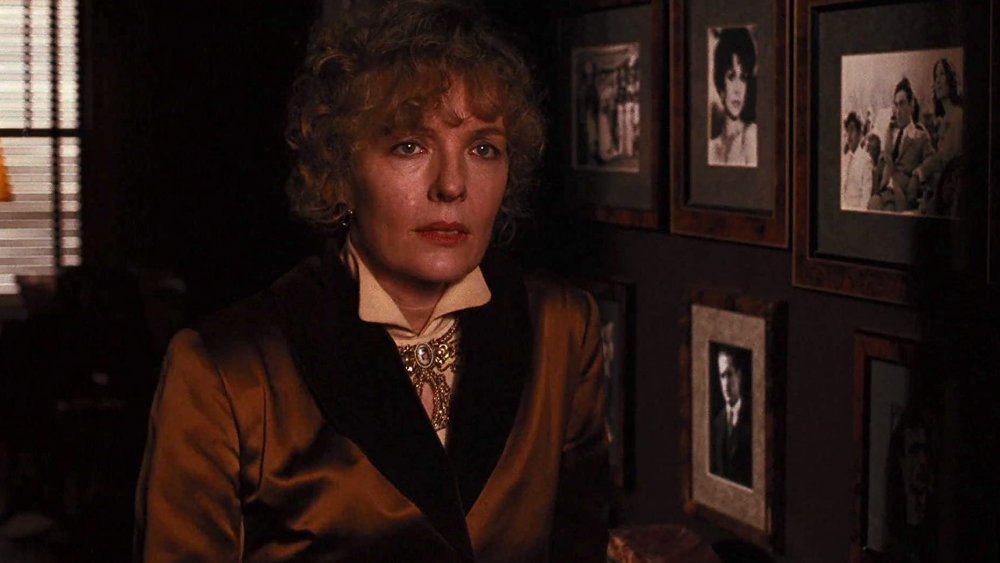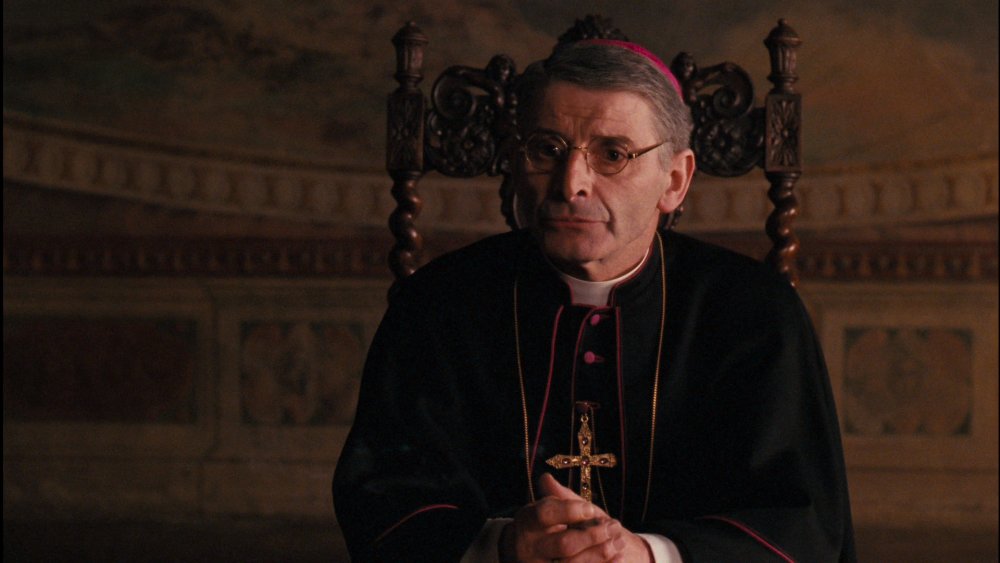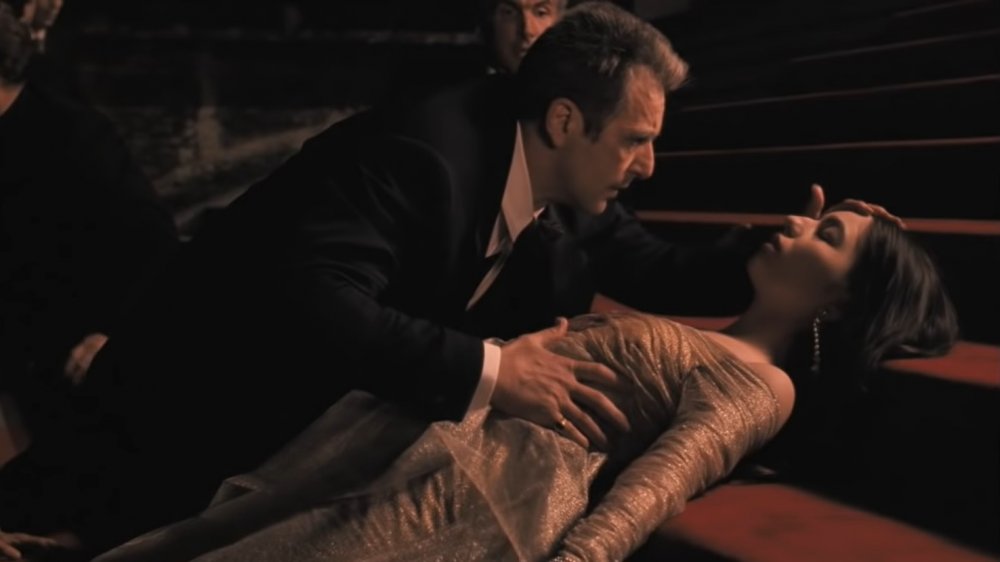The Ending Of The Godfather Trilogy Finally Explained
In 1972, director Francis Ford Coppola and his co-writer, Mario Puzo, teamed up to bring Puzo's bestselling novel about a crime family and their struggles to the big screen. As a result, The Godfather became one of the most acclaimed films ever made. It ranks even today as an American classic that's almost universally beloved. And then, two sequels followed — the nearly universally beloved Godfather Part II and the more divisive Godfather Part III. Over the course of those films, Coppola and Puzo worked together to weave a complex web of alliances and betrayals, lovers and fighters, sins and triumphs.
The Godfather trilogy is the story of Michael Corleone, the one member of the Corleone crime family who was supposed to get out and be something more legitimate, a man who's repeatedly sucked back into the life of his father and his brothers through years of violence, regret, and family connections. It's an American tragedy that plays out across more than three decades of history, and it's filled with various key events that are still worth dissecting as part of a larger whole. And even now, the ending of this series packs an incredible emotional punch. So leave the gun, take the cannoli, and read on as we explain the ending of The Godfather trilogy.
The first Godfather ends with a bloody baptism
One of the most famous moments in the entire Godfather trilogy arrives near the end of the first film, when Michael Corleone attends the baptism of his nephew/godson while his associates carry out various assassinations all around him. The murders are designed to tie up loose ends that exist within the plot of the first film, but they have broader implications that ring out for years.
The various hitmen dispatched around New York (and, in one case, Las Vegas) are tasked with taking down the heads of each of the other Five Families — Don Barzini, Don Tattaglia, Don Cuneo, and Don Stracci — as well as Moe Greene, the casino magnate who attempted to block Corleone control in Vegas. In the aftermath of the purge, Michael orders the deaths of both his former captain Tessio and his brother-in-law Carlo for playing parts in attacks on the Corleone family.
The result is a firm warning to the other families that the Corleones are in a new position of strength. Plus, they now have control in Vegas, where Michael intends to expand his efforts to legitimize the family business. Sure, he had to spill a lot of blood, but now Michael can try to move beyond the old ways of doing things and into something new. The other families don't stop existing, but they do stop being the same threat to the Corleones that they were during the era of Michael's father, Vito Corleone.
The Corleones leave New York
At the beginning of The Godfather, the Corleones are a powerful yet distinctly New York crime organization with a family compound in the Big Apple and a host of business affairs tied up in the city. Even the legitimate family business headquarters — Genco Pura Olive Oil — is based in New York. By the end of the film, though, power hasn't just transferred from Vito Corleone to his son, Michael. It's also moving from New York to all the way out west.
As he explained to his future wife, Kay, back in 1950, Michael is determined that it will only take five years for his family to become "completely legitimate," and he believes that operations in Las Vegas are a big part of that mission. With this in mind, as the film ends, the Corleone family is preparing to leave the family compound in New York to settle in Nevada, having already sent both Fredo Corleone and Tom Hagen to the desert to begin operations there. It's a major move toward legitimacy, but the implications are more far-reaching than just Michael's business interests, and they'll be echoing down through family history for decades.
The remnant of the Corleone family
Much of the endgame of The Godfather revolves around Michael Corleone's master plan to achieve two key goals: knock out his family's enemies and move his family's operations away from New York City and into Nevada, where he hopes to take on more legitimate dealings. Both goals make sense, but neither event happens in a vacuum. Even after the Corleones themselves leave New York, the Corleone family remains a factor in NYC.
After Michael takes over the family, Corleone captains Clemenza and Tessio come to him with a request to start their own families after the Corleones leave New York. Michael agrees, but after discovering that Tessio has betrayed the family, he sends him off to sleep with the fishes. That leaves Clemenza, who stays behind in the city and establishes his own faction, still loyal to the Corleones.
This new iteration of the New York "family" continues to operate after The Godfather ends, changing hands even after Clemenza passes away as the last remnant of the family's original founders. The New York crime family remains a part of Michael's life, and it will eventually become a thorn in his side in later years when new players come onto the scene.
In The Godfather Part II, Michael moves toward legitimacy
Picking up in 1958, three years after the events of the last movie, The Godfather Part II finds Michael still promising his wife Kay that he will take the family into complete legitimacy. This effort includes purchasing more hotels and casinos and partnering with legendary mob tycoon Hyman Roth to open new properties in Cuba, where the government is friendly to their business interests. Roth, meanwhile, has decided that a key to his own plans is eliminating Michael from the picture while feigning talk of retirement.
Despite Michael's best efforts to keep things on the business side, a war breaks out, exacerbated by the presence of Frank Pentangeli, Clemezna's replacement as the head of the former Corleone family in New York. The resulting carnage helps to trigger a Senate committee investigation of the Corleones, and it reveals that Michael's brother, Fredo, betrayed him to Roth in an effort to bolster his own reputation and sense of self-worth. Michael, still eager for legitimacy, dives back into violence, ordering the deaths of Roth, Pentangeli, and finally, Fredo. No matter how hard he tries to escape his family's criminal past, it keeps coming back to haunt him.
A marriage comes to an end
Kay Corleone knew her boyfriend Michael had an interesting family at least somewhat early on in their relationship, and Michael wasn't necessarily shy about sharing some of the less savory details of his father's business with her even before they were married. In those days, though, it was always in the context of something Michael planned to escape. He was determined not to be like his father, so when he told her the business would be legitimate and that he didn't order his own brother-in-law killed, she believed him.
Fast forward nearly a decade since that initial promise of legitimacy, and Kay is convinced that Michael is beyond redemption. Once an attempt on Michael's life is made in which she herself is almost shot, Kay realizes that Michael cannot and will not change, at least not fast enough to save the lives of her children. So she has an abortion, refusing to bring another child into a family of violence, and ultimately, she decides to leave him. We learn later that this has the lasting impact of a kind of familial cold war that will haunt Michael's relationship with his children for years to come.
The everlasting guilt of Michael Corleone
The most famous scene in The Godfather Part II is, almost without question, the moment when Michael's brother Fredo heads out on the lake with Corleone captain Al Neri to go fishing. Once they're out in the boat, secluded from the rest of the world, Neri shoots Fredo, disposing of Michael's betrayer and the last in a long line of people who've tried to grind his new business deals to a halt.
We learn later that what really happened to Fredo has become something of a family legend in the years that followed, as those loyal to Michael denied it was a hit and those less loyal (like Kay and her son Anthony) came to believe Michael was behind it all along. In Michael's case, the death of his brother wasn't just another necessary evil but the one sin he could never fully escape. Fredo's death would haunt him until the day he died, and in its aftermath, he left his Nevada compound to rot, moved back to New York, and set up a charitable foundation to give away his wealth.
The rise of Vincent Corleone
The Godfather Part III introduces another major player to the Corleone family's dealings in the form of Vincent Mancini, the son of the late Santino "Sonny" Corleone and his mistress, and he's a man who has all of his father's temper and brashness. Vincent has taken up a life on the criminal side of the family, working with and eventually feuding with Corleone leader Joey Zasa, even though Michael has encouraged him to go legitimate. When a battle with Zasa ensues, though, Vincent finds himself at the center of his uncle's life, even as Michael is trying to move away from the mob once and for all.
By the end of the film, Vincent has proven himself an invaluable ally, so much so that Michael rewards him by making him the new "Don Corleone," placing him in charge of what's left of the Corleone criminal enterprise. Then Mary Corleone — Michael's daughter, who Vincent fell in love with — is tragically gunned down on the steps of the Palermo Opera House, breaking Michael's spirit. Vincent is also shattered by the death of Mary, but it's clear from his quick reaction to the shootout that his rise as a new power in the criminal world will continue. The only question is whether or not he'll burn too hot like his father did.
Kay, Connie, and years of mourning
In the years since The Godfather Part II, Michael's wife Kay and his sister Connie have had very different reactions to his ruthless attempts to stay in power. Kay has turned her back on Michael, divorcing him and retaining custody of their children, while Connie has ultimately leaned into the family business to such an extent that she seems almost more ruthless than Michael. It's Connie who orders the hit on Joey Zasa while Michael is in the hospital, and it's Connie who ultimately kills the treacherous Don Altobello when it's revealed that he betrayed the family. Meanwhile, Kay seems to finally be coming around to the idea that she and Michael could reconnect ... and then Mary is killed.
In the moments after Mary's death, we see Kay react momentarily to Michael's own grief, and we see the despair in her eyes. Then we see Connie, who's so distraught that she literally pulls her black shawl up over her head, like a mourning hood. These two women have been broken in some way by this, no matter how ruthless Connie was or how forgiving Kay could've been. They will never recover, or if they do, they will be profoundly different people. It's not hard, for example, to see Connie as someone who turns even colder after losing her niece.
The Vatican fallout in The Godfather Part III
The Godfather films all unfold with a sense of world history happening around the Corleone family saga, and sometimes the family's fortunes directly intersect with those major events. In The Godfather Part II, it's the Cuban revolution, and in The Godfather Part III, it's the Vatican Banking Scandal and the sudden death of John Paul I. While the film offers a heavily fictionalized version of these events — including the idea that John Paul was poisoned for his part in approving Michael Corleone's Immobiliare deal — it also presents a very interesting portrait of one of the world's oldest institutions and how it might respond to such direct mob involvement.
By the end of the film, the Pope is dead, and an archbishop has been gunned down within Vatican City. One way or another, that means the Vatican as it exists in the world of The Godfather will never be the same. Even if Michael's heirs manage to retain his Immobiliare holdings, there will always be a shadow of suspicion. In the world of this film, nothing can ever be completely "legitimate," no matter how benevolent the efforts were.
The Godfather trilogy comes to an end
The heart of The Godfather trilogy has always been the fundamental tragedy of Michael Corleone's life. When we meet him, he's a young man who cares about his family deeply but doesn't want to be involved in the family business until violence pushes him to take action. Then he does his best to divest himself of the criminal elements of his life until he's forced to take even more extreme measures to simply preserve those closest to him. By the end, just when it seems that he's finally made a clean break, one last act of violence shatters what he holds dearest in his entire life.
The last time we see Michael Corleone, he's an old man alone in Sicily, dying while dogs wander the grounds around him. We don't get to see the intervening years, what happened to him after Mary's death, but it's clear that he's resigned to a life of sadness and regret. Rather than fighting it, rather than seeking redemption or even vengeance, he's simply given himself over to despair because he knows he can never beat it. In that way, for all the gangster swagger, The Godfather is ultimately the story of an American tragedy.
